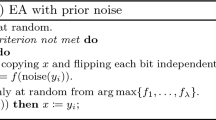Abstract
We analyze the transition and convergence properties of genetic algorithms (GAs) applied to fitness functions perturbed concurrently by additive and multiplicative noise. Both additive noise and multiplicative noise are assumed to take on finitely many values. We explicitly construct a Markov chain that models the evolution of GAs in this noisy environment and analyze it to investigate the algorithms. Our analysis shows that this Markov chain is indecomposable; it has only one positive recurrent communication class. Using this property, we establish a condition that is both necessary and sufficient for GAs to eventually (i.e., as the number of iterations goes to infinity) find a globally optimal solution with probability 1. Similarly, we identify a condition that is both necessary and sufficient for the algorithms to eventually with probability 1 fail to find any globally optimal solution. Our analysis also shows that the chain has a stationary distribution that is also its steady-state distribution. Based on this property and the transition probabilities of the chain, we compute the exact probability that a GA is guaranteed to select a globally optimal solution upon completion of each iteration.
Similar content being viewed by others
References
Arnold, D.V.: Noisy Optimization with Evolution Strategies. Kluwer Academic, Boston (2002)
Beyer, H.G.: Evolutionary algorithms in noisy environments: theoretical issues and guidelines for practice. Comput. Methods Appl. Mech. Eng. 186, 239–267 (2000)
Chen, A., Subprasom, K., Ji, Z.: A simulation-based multi-objective genetic algorithm (SMOGA) procedure for BOT network design problem. Optim. Eng. 7, 225–247 (2006)
Davis, T.E., Principe, J.: A Markov chain framework for the simple genetic algorithm. Evol. Comput. 1, 269–288 (1993)
Di Pietro, A., White, L., Barone, L.: Applying evolutionary algorithms to problems with noisy, time-consuming fitness functions. In: Proceedings of the 2004 Congress on Evolutionary Computation, vol. 2, pp. 1254–1261 (2004)
Goldberg, D.E., Rudnick, M.W.: Genetic algorithms and the variance of fitness. Complex Syst. 5, 265–278 (1991)
Hopkins, W.E.: Optimal stabilization of families of linear stochastic differential equations with jump coefficients and multiplicative noise. SIAM J. Control Optim. 25, 1587–1600 (1987)
Jebalia, M., Auger, A.: On multiplicative noise models for stochastic search. In: Proceedings of the 2008 International Conference on Parallel Problem Solving from Nature, pp. 52–61 (2008)
Jin, Y., Branke, J.: Evolutionary optimization in uncertain environments—a survey. IEEE Trans. Evol. Comput. 3, 303–317 (2005)
Karlin, S., Taylor, H.M.: A First Course in Stochastic Processes. Academic Press, New York (1975)
Karlin, S., Taylor, H.M.: A Second Course in Stochastic Processes. Academic Press, New York (1981)
Leung, K.S., Duan, Q.H., Xu, Z.B., Wong, C.K.: A new model of simulated evolutionary computation—convergence analysis and specifications. IEEE Trans. Evol. Comput. 5, 3–16 (2001)
Miller, B.L., Goldberg, D.E.: Genetic algorithms, selection schemes, and the varying effects of noise. Evol. Comput. 4, 113–131 (1996)
Nakama, T.: Markov chain analysis of genetic algorithms applied to fitness functions perturbed by multiple sources of additive noise. Stud. Comput. Intell. 149, 123–136 (2008)
Nakama, T.: Theoretical analysis of genetic algorithms in noisy environments based on a Markov model. In: Proceedings of the 2008 Genetic and Evolutionary Computation Conference, pp. 1001–1008 (2008)
Nissen, V., Propach, J.: On the robustness of population-based versus point-based optimization in the presence of noise. IEEE Trans. Evol. Comput. 2, 107–119 (1998)
Nix, A., Vose, M.D.: Modeling genetic algorithm with Markov chains. Ann. Math. Artif. Intell. 5, 27–34 (1992)
Primbs, J.A.: Portfolio optimization applications of stochastic receding horizon control. In: Proceedings of the 2007 American Control Conference, vol. 1, pp. 1811–1816 (2007)
Rudin, L.I., Osher, S.: Total variation based image restoration with free local constraints. In: Proceedings of the 2004 International Conference on Image Processing, vol. 1, pp. 31–35 (2004)
Rudolph, G.: Convergence analysis of canonical genetic algorithms. IEEE Trans. Neural Netw. 5, 96–101 (1994)
Rudolph, G.: Partial order approach to noisy fitness functions. In: Proceedings of the 2001 IEEE Congress on Evolutionary Computation, pp. 318–325 (2001)
Suzuki, J.: A Markov chain analysis on simple genetic algorithms. IEEE Trans. Syst. Man Cybern. 25, 655–659 (1995)
Vose, M.D.: The Simple Genetic Algorithm. MIT Press, Cambridge (1999)
Vose, M.D., Liepins, G.E.: Punctuated equilibria in genetic search. Complex Syst. 5, 31–44 (1991)
Author information
Authors and Affiliations
Corresponding author
Additional information
Supported by the Acheson J. Duncan Fund for the Advancement of Research in Statistics.
Rights and permissions
About this article
Cite this article
Nakama, T. Markov chain analysis of genetic algorithms applied to fitness functions perturbed concurrently by additive and multiplicative noise. Comput Optim Appl 51, 601–622 (2012). https://doi.org/10.1007/s10589-010-9371-1
Received:
Published:
Issue Date:
DOI: https://doi.org/10.1007/s10589-010-9371-1




